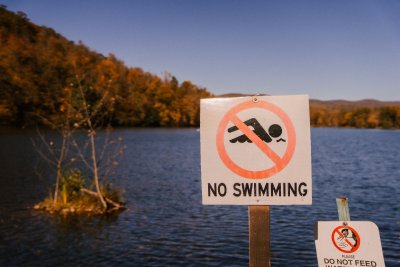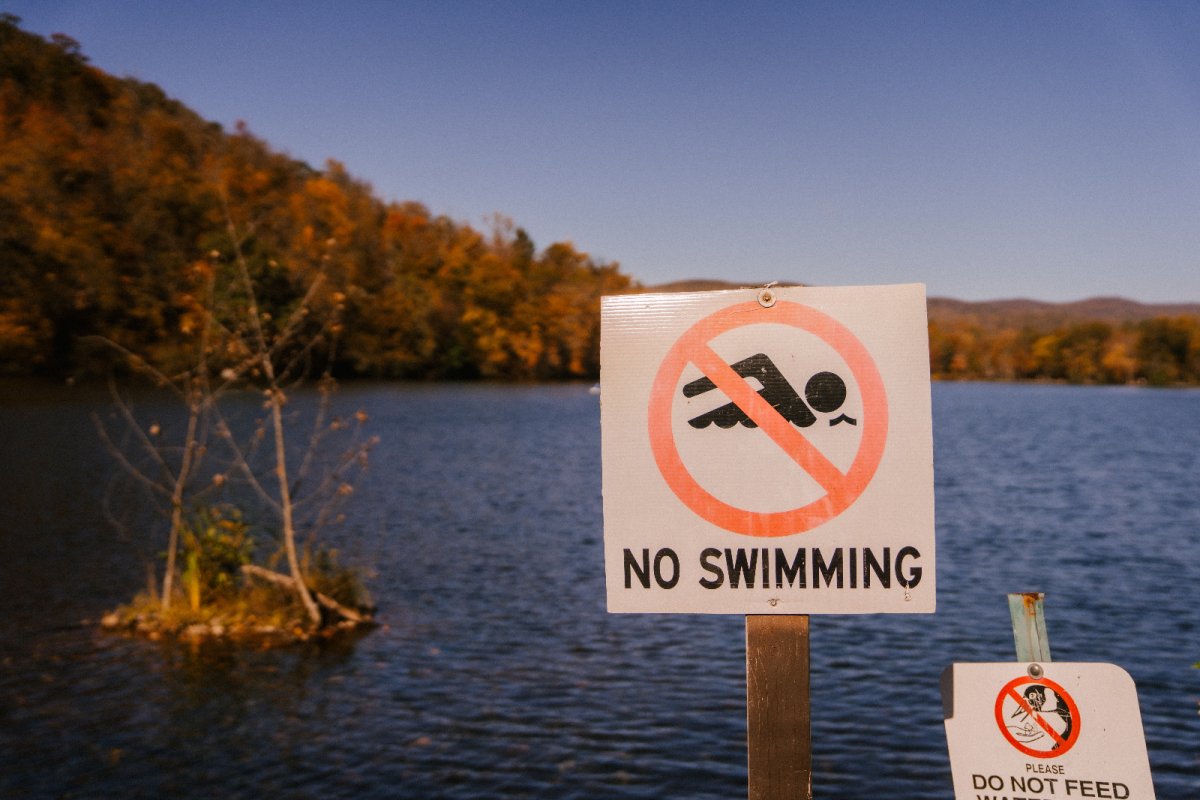 No swimming sign near water - only 14% UK rivers have 'good ecological status'. Credit: Marta Wave, Pexels
No swimming sign near water - only 14% UK rivers have 'good ecological status'. Credit: Marta Wave, Pexels
In the UK, we need to eat and produce less meat to have any hope of avoiding catastrophic climate breakdown, and we have known this for years. But in 2022 things got more serious. 140 million poultry including half the UK’s free range turkeys were culled in the latest avian flu outbreak, which is now killing vulnerable and rare wild birds across the UK. Our waterways are so polluted that a House of Lords committee warned that a ‘chemical cocktail’ of sewage, slurry and plastic is putting public health and nature at risk. In November our rivers were found to be polluted with antibiotic-resistant superbugs downstream of factory farms. Added to this, research last year from WWF linked meat in European diets with widespread deforestation and conversion of habitats in South America.
It is extraordinary, then, that polluting livestock mega-farms are on the rise in the UK. Far from reducing, factory farming is growing. We believe local councils are key to turning this trend around, protecting citizens and our wildlife, and supporting sustainable, wildlife-friendly farming.
We don’t need any more factory farms in the UK
By ‘factory farming’ we mean the most intensive industrial animal production, with animals normally kept indoors, in crowded conditions with little or no natural light. This is distinct from more sustainable, higher welfare and nature-friendly agro-ecological farming, which is more resilient to climate change and vastly better for people and the planet.
Economic benefits are often posed as a justification for more and more industrial farming - particularly presient in times of growing inequality. In reality factory farms create few jobs, cost the taxpayer millions in subsidies and compensation and have been found to harm other rural business sectors.
To put it simply, we already have too much intensive animal production. To have any hope of reversing the shocking decline in wildlife in the UK, we must call a halt to any further expansion of factory farming.
"Local councils are key to turning this trend around, protecting citizens and our wildlife, and supporting sustainable, wildlife-friendly farming"
How can councils help?
Factory farming is at odds with just about every ambition of the UK’s planning policy, including economic, social and environmental objectives, using natural resources prudently, minimising waste and pollution, and mitigating and adapting to climate change. It’s hard to imagine an industry more ecologically wasteful, harmful to the health of people and the environment and economically unsustainable.
At the moment, industrial meat companies are manipulating the planning system to get factory farms approved. Councils need policies with strong commitments to protect their citizens and the environment from factory farming.
We want to support councils to:
- Assess the impact of the intensive agriculture in their area - on wildlife, water and economy, including the impacts on deforestation, greenhouse gas emissions and biodiversity loss.
- Analyse how you they meet new targets set out in the Environment Act and Water Framework Directives through action to limit intensive industrial animal farming.
- Commit to taking action to control the impacts in their area, and placing a moratorium on new intensive industrial animal farming, should the evidence provide a compelling case for such action.
There are a number of routes to setting good policy, including supplementary planning policies, statements in the local plan, Green Infrastructure Strategies (GIS), Nature Recovery Strategies, Biodiversity Net Gain (BNG) and Clean Air Strategies. Councils must also support a transition to sustainable diets through procurement, public messaging, advertising and reducing food waste.
"To have any hope of turning around the shocking decline in wildlife in the UK, we must call a halt to any further expansion of factory farming"
What do we need from national governments?
Food and planning are devolved issues. At the moment, national planning policy is completely out of sync with policy on the environment in all nations, including the UK Government’s biodiversity, water quality and nature recovery targets and legally-binding target to achieve net zero. National planning policy must have clearer requirements for planning applications to align with government strategies and councils should be able to refuse proposals that don’t meet national or local environmental aims.
How can you help? Take action now
Please ask your council to act now – sending our pre-made letter takes less than two minutes.
And sign up to the Food for the Planet newletter to be kept in the know about our mission to halt the expansion of factory farming.
More information about the destruction caused by factory farms in our countryside:
- Polluting our water, air and land: Farming is the main cause of pollution in our rivers, choking them with algal blooms that reduce oxygen levels, suffocating fish, plants and invertebrates. Only 14% English rivers meet ‘good ecological status’.
- Destroying our wildlife: Intensive livestock farming is the biggest contributor to wildlife decline in the UK. 40% of the UK’s arable land is used to grow feed for farm animals. One poultry shed with 40,000 birds needs more than 200 hectares to produce the feed it needs. Quite simply, we need some of that land back so nature can recover, and to lock up carbon and halt climate change.
- Holding us back from tackling the climate emergency: We must pursue solutions to climate change that make us healthier, happier and reduce inequality. Tackling factory farming is the lowest-hanging fruit.
- Risking our food security: Factory farming is not the solution to affordable food. In fact, it is an incredibly inefficient way to produce protein and is contributing to rising global food prices by hoovering up grain and soya that could be fed directly to people.
- Risking our health: Crowded factory farm conditions create the perfect incubator for disease, especially coronaviruses. Antibiotic overuse in farming is creating a global threat of antibiotics resistance.
Food for the Planet: Food for the Planet is helping local authorities, businesses and organisations take simple actions to tackle the climate and nature emergency through food.
Sustain
The Green House
244-254 Cambridge Heath Road
London E2 9DA
020 3559 6777
sustain@sustainweb.org
Sustain advocates food and agriculture policies and practices that enhance the health and welfare of people and animals, improve the working and living environment, promote equity and enrich society and culture.
© Sustain 2024
Registered charity (no. 1018643)
Data privacy & cookies








